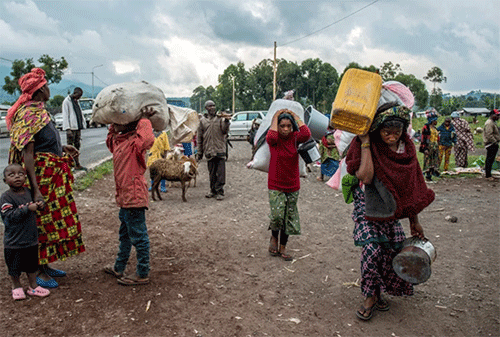GOMA – The squalid displacement camps near the city of Goma in the eastern Democratic Republic of Congo (DRC) stand as a testament to the government’s struggle to solve insecurity, a key issue ahead of elections later this month.
In the conflict-torn east of the impoverished but mineral-rich central African nation, many feel abandoned.
“We live like animals,” said 28-year-old Anna Mastaki, who lives in one of the camps on the outskirts of Goma, the capital of North Kivu province. Chantal Uwimana, who also fled the Masisi region west of Goma, said she hadn’t been able to register to vote in the 20 December polls.
“Are we, the displaced people, not Congolese like everyone else, after all?” the mother of eight asked. “We’re going to see this election take place while we’re living outside in the
rain.”
Much of eastern DRC is prey to armed groups, a legacy of regional wars which flared in the 1990s and 2000s. One of them, the M23, has seized swathes of territory since late 2021, driving more than a million people from their homes.
Doctors Without Borders says tens of thousands of families are still fleeing violence in North Kivu. But the ongoing conflict and escalating violence mean the scale of the humanitarian disaster in the region is huge.
According to the United Nations, nearly seven million people have been displaced in the DRC — the highest number yet recorded in the country.
President Felix Tshisekedi, 60, who is running for re-election, has promised to tackle rampant insecurity. “As long as I haven’t solved the problem of security, I won’t have succeeded in my mandate,” he said on a 2021 visit to the east.
But after five years in power, the situation in eastern DRC has only grown worse. Thousands of civilians have been killed and tens of thousands of women have been raped, according to figures from research groups and humanitarian organisations.
Hundreds of thousands of people inhabit displacement camps near Goma, most having fled clashes in the province.
The Tutsi-led M23 group took up arms again in 2021 after years of dormancy, launching a campaign which has seen it seize strategic towns across North Kivu and come within several dozen kilometres (miles) of Goma.
The DRC, several Western countries, including the United States, and independent United Nations experts accuse Rwanda of backing the M23, a claim denied by Kigali.
After several months of calm on the frontlines, clashes erupted again in October, pitting the M23 against Congolese soldiers and pro-government militias. Living in dire poverty in one of the camps, Bahati Nvano, 45, complained of feeling cast aside as the rest of the country gears up to cast their ballots.
He fled his native Kiwanja, about 70 kilometres north of Goma, with his children, only to end up crammed into a makeshift tarpaulin tent. “We haven’t received our voters’ cards,” he said, expressing worry because the document is one of the few ID cards accepted in the DRC. – Nampa/AFP



